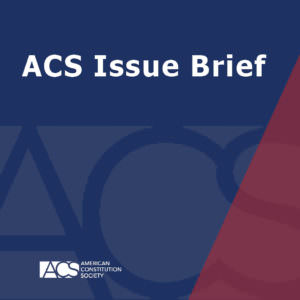Reinvigorating the Federal Pardon Process: What the President Can Learn from the States
Founder, Law Office of Margaret Love and former U.S. Pardon Attorney
January 24, 2013
 ACS is pleased to distribute “Reinvigorating the Federal Pardon Process: What the President Can Learn from the States” by Margaret Colgate Love of the Law Office of Margaret Love and formerly of the Office of the U.S. Pardon Attorney.
ACS is pleased to distribute “Reinvigorating the Federal Pardon Process: What the President Can Learn from the States” by Margaret Colgate Love of the Law Office of Margaret Love and formerly of the Office of the U.S. Pardon Attorney.
The presidential exercise of the pardon power, or lack thereof, has been the subject of national conversation in recent months. As Margaret Colgate Love describes in her Issue Brief, this much discussed, but not often used, executive power and process "has lost its vigor, its integrity, and its sense of purpose.” The latest assessments of the federal pardon process suggest a process plagued by racial and class disparities, and in at least one case, misconduct on the part of the Pardon Attorney.
Rather than "live with a dysfunctional pardon process," Love identifies state pardon models that the President and federal justice system could adopt. Highlighted for their “authority,” “accountability,” and "transparency," Love explains that these models are necessary responses to the "hard to understand and even harder to penetrate, operating in secret and accountable to no one" Justice Department Pardon Office. According to Love, “there is not a single state whose pardon process is as poorly conceived and managed as the federal government’s.” The process must “evolve with the changing needs of the presidency and of the justice system,” Love concludes.
Read the full Issue Brief here: Reinvigorating the Federal Pardon Process: What the President Can Learn from the States
“Toward a More Perfect Union: A Progressive Blueprint for the Second Term” is a series of ACS Issue Briefs offering ideas and proposals that we hope the administration will consider in its second term to advance a vision consistent with the progressive themes President Obama raised in his second Inaugural Address. The series should also be useful for those in and outside the ACS network – to help inform and spark discussion and debate on an array of pressing public policy concerns. The series covers a wide range of issue areas, including immigration reform, campaign finance, climate change, criminal justice reform, and judicial nominations.
